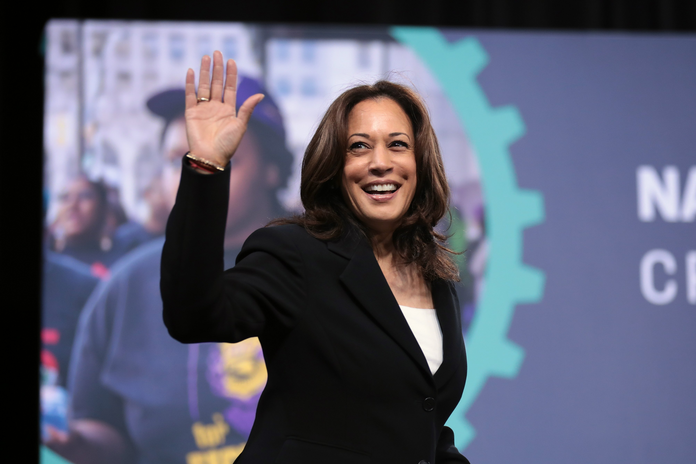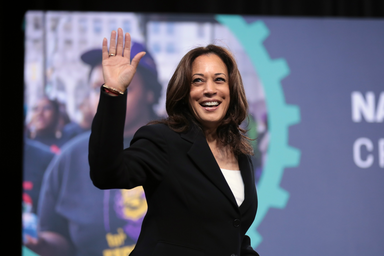Vice President and Presidential Candidate Kamala Harris made headlines recently with her appearance on the popular podcast Call Her Daddy, hosted by Alex Cooper. In this episode, Harris dives into critical issues regarding domestic violence, bodily autonomy, and personal agency. Her appearance in the episode, “Vice President Kamala Harris”, aligned with the Harris-Walz campaign, which has focused on engaging young voters. The podcast interview provided an opportunity for Harris to connect with young voters, a demographic that is becoming increasingly influential in elections as more of the generation reaches legal voting age.
Harris starts the episode by discussing her personal history, focusing specifically on her childhood, mother, and career. She opens up about lessons her mother taught her, saying that her mother emphasized the “importance of being able to express how [she was] feeling,” and that she believes the intention behind this was to teach her that she had agency. Harris explains that since she was taught she had agency, it is important to take charge of a moment rather than just letting things happen to you. She goes on to tie this theme into her career as a prosecutor, stating that her main goal was “to protect the most vulnerable…” It is clear in listening to this episode that personal agency is an important topic for Harris and that it’s something she’s willing to fight for. She hopes she can “convince people that they should vote [because] you should never let anyone take your power from you.”
As a prosecutor who specialized in sexual assault cases, Harris stresses the importance of domestic violence awareness. She shares the impactful story of her high school best friend, Wanda, who experienced sexual assault at the hands of her stepfather, and how Harris and her family stepped in to help. She urges listeners who are experiencing domestic violence to say something, urging them not to “quietly suffer.” This is an important piece in the conversation as talking about domestic violence helps destigmatize it.
Harris says that one of the biggest issues surrounding domestic violence is that “people don’t talk about it” and that “The more we let anything exist in the shadows, the more likely it is that people are suffering and suffering silently.” Harris emphasizes the repercussions for women, specifically women with children, having an economic reliance on their abuser. She says that “Most women will endure whatever personal, physical pain they must in order to make sure their kids have a roof over their head or food.” Harris explains that economic independence for women is fundamental in order to liberate them from their abusers.
The episode also discussed reproductive rights and bodily autonomy in light of ongoing debates surrounding abortion access. Harris called out her opponent, former President Donald Trump, saying,“When he was president, [he] hand-selected three members of the United States Supreme Court with the intention that they would undo the protections of Roe v. Wade.” She explains the current abortion bans in the U.S., highlighting that 20 states now have Trump-instated abortion bans. At this time, 13 states have complete abortion bans in place, and 28 states have abortion bans that include exceptions. Harris goes on to emphasize that the right to make decisions about one’s own body is fundamental and should not be dictated by the government, claiming that it is outrageous that the U.S. government “somehow have decided that they’re in a better position to tell you what’s in your best interest then you are to know what’s in your own best interest.”
Call Her Daddy is known for its candid discussions about relationships and sexuality. Harris’ interview has raised the eyebrows of conservative political commentators. Critics argue that the podcast, often creating explicit content, might decrease the credibility of her political platform. I would argue that the criticism of Harris’ appearance on the podcast is overshadowing the significant issues discussed. The political landscape of the U.S. is fraught with debates over reproductive rights and domestic violence. Harris’ supporters countered that engaging with a diverse audience is essential for a contemporary political campaign. Though it may be outside of the norm in terms of political campaigning, Call Her Daddy serves as a platform for connecting with Gen Z voters in a way that is suited to them.
In this episode of Call Her Daddy, Harris spoke to the values and concerns of many young Americans. Her candid discussions about personal agency, domestic violence, and reproductive rights not only reinforce her political stances but position herself as an advocate for these concerns. In a political landscape where young voters often feel disenfranchised, Harris’ approach stands out. Young voters often feel disconnected from candidates, however, Harris’ willingness to engage in an honest conversation, even when it is uncomfortable, allows listeners to see her in a more genuine light. In a time when political engagement among young people is crucial, Harris’ ability to connect on a personal level may inspire greater voter turnout. Harris offers a vision of the future where voices matter, bridging the gap between political discourse and the lived experience of young Americans.


